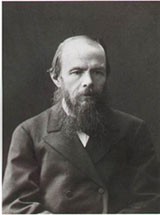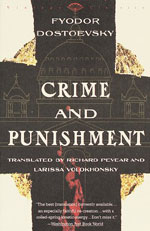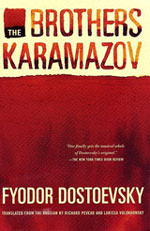影片对白
On your day off, get as far away from this place as you can. Go someplace where
you feel most like yourself.
思想火花 The
Lake House 是改编自数年前的韩国电影《触不到的恋人》,一个发生在时空交错下偶然邂逅的爱情故事。
考考你
一展身手
文化面面观
Dostoyevsky
陀思妥耶夫斯基
 Dostoyevsky, Feodor Mikhailovich, 1821-81, Russian novelist, one of the
towering figures of world literature.
Dostoyevsky, Feodor Mikhailovich, 1821-81, Russian novelist, one of the
towering figures of world literature.
Dostoyevsky was born and raised in Moscow by Russian Orthodox parents. His
father, a military surgeon and an alcoholic of harsh, despotic temperament, was
brutally slain (1839) by his own serfs. This event haunted Dostoyevsky all his
life and perhaps accounts in part for the preoccupation with murder and guilt in
his writings. Dostoyevsky attended military engineering school in St. Petersburg
and upon graduation entered government service as a draftsman. He soon abandoned
this career for writing.
Dostoyevsky's first published work, Poor Folk (1846), which brought
him immediate critical and public recognition, reveals his characteristic
compassion for the downtrodden. His second novel, The Double (1846),
less favorably received, shows the profound insight into human character that
dominates his later works.
At about this time Dostoyevsky became involved with a group of radical
utopians. The discovery of their illegal printing press brought about their
arrest and condemnation. The prisoners were reprieved but were forced to take
part in a pre-execution ceremony before the reprieve was read to them.
Dostoyevsky was sentenced to four years at hard labor in a Siberian penal
colony. During this harrowing period he suffered great physical and mental pain,
including repeated attacks of epilepsy. The prison experience worked a profound
change of heart in him. He abandoned his belief in the liberal, atheistic
ideologies of Western Europe and turned wholeheartedly to religion and to the
belief that Orthodox Russia was destined to be the spiritual leader of the
world.
 After several years of obligatory military service in Siberia, he was allowed
to return to St. Petersburg. With him was the widow he had married in Siberia
and her son. Dostoyevsky joined his beloved brother Mikhail in editing the
magazine Time, which serialized The Insulted and The Injured
(1861-62) and the record of his experience in the penal colony, The House of
the Dead (1862). He made several trips to Western Europe. One result was
Winter Notes on Summer Impressions (1863), reflecting his severely
anti-Western attitudes.
After several years of obligatory military service in Siberia, he was allowed
to return to St. Petersburg. With him was the widow he had married in Siberia
and her son. Dostoyevsky joined his beloved brother Mikhail in editing the
magazine Time, which serialized The Insulted and The Injured
(1861-62) and the record of his experience in the penal colony, The House of
the Dead (1862). He made several trips to Western Europe. One result was
Winter Notes on Summer Impressions (1863), reflecting his severely
anti-Western attitudes.
Financial troubles, combined with a turbulent love affair and a passion for
roulette, led to a nightmarish period in Germany, partly described in the short
novel The Gambler (1866). In 1864 his unhappy marriage ended with the
death of his wife. The same year his financial problems increased when his
brother died and Dostoyevsky assumed responsibility for the remaining family. In
1867 he married his young secretary, who gave him profound affection and
understanding and greatly enriched his later years.
Notes from the Underground (1864), a detailed study of neurotic
suffering, began the greatest period of Dostoyevsky's literary career. Crime and
Punishment, a brilliant portrait of sin, remorse, and redemption through
sacrifice, followed in 1866. His next novel, The Idiot (1868), concerns
a Christ figure, a meek, human epileptic whose effect on those around him is
tragic.
 The Possessed (1871-72) is a violent denunciation of the leftists
and revolutionaries that Dostoyevsky had previously admired. In A Raw
Youth (1875) he described decay within family relationships and the
inability of science to deal with the primary need of human beings: a purpose
for living beyond the mere struggle for sustenance. Both of these themes are
central to the enormously complex plot and character development of his
masterpiece, The Brothers Karamazov (1879-80), generally thought to be
one of the finest novels ever written.
The Possessed (1871-72) is a violent denunciation of the leftists
and revolutionaries that Dostoyevsky had previously admired. In A Raw
Youth (1875) he described decay within family relationships and the
inability of science to deal with the primary need of human beings: a purpose
for living beyond the mere struggle for sustenance. Both of these themes are
central to the enormously complex plot and character development of his
masterpiece, The Brothers Karamazov (1879-80), generally thought to be
one of the finest novels ever written.
A profound psychologist and philosopher, Dostoyevsky depicted with remarkable
insight the depth and complexity of the human soul. His powerful though
generally humorless narrative style, his understanding of the intricacies of
character, especially the pathological conscience, and his amplification of sin
and redemption made him a giant among novelists and, in the realm of ideas, a
precursor of Freudian psychological analysis. Dostoyevsky died of a lung
hemorrhage complicated by an attack of epilepsy.
(www.answers.com
)